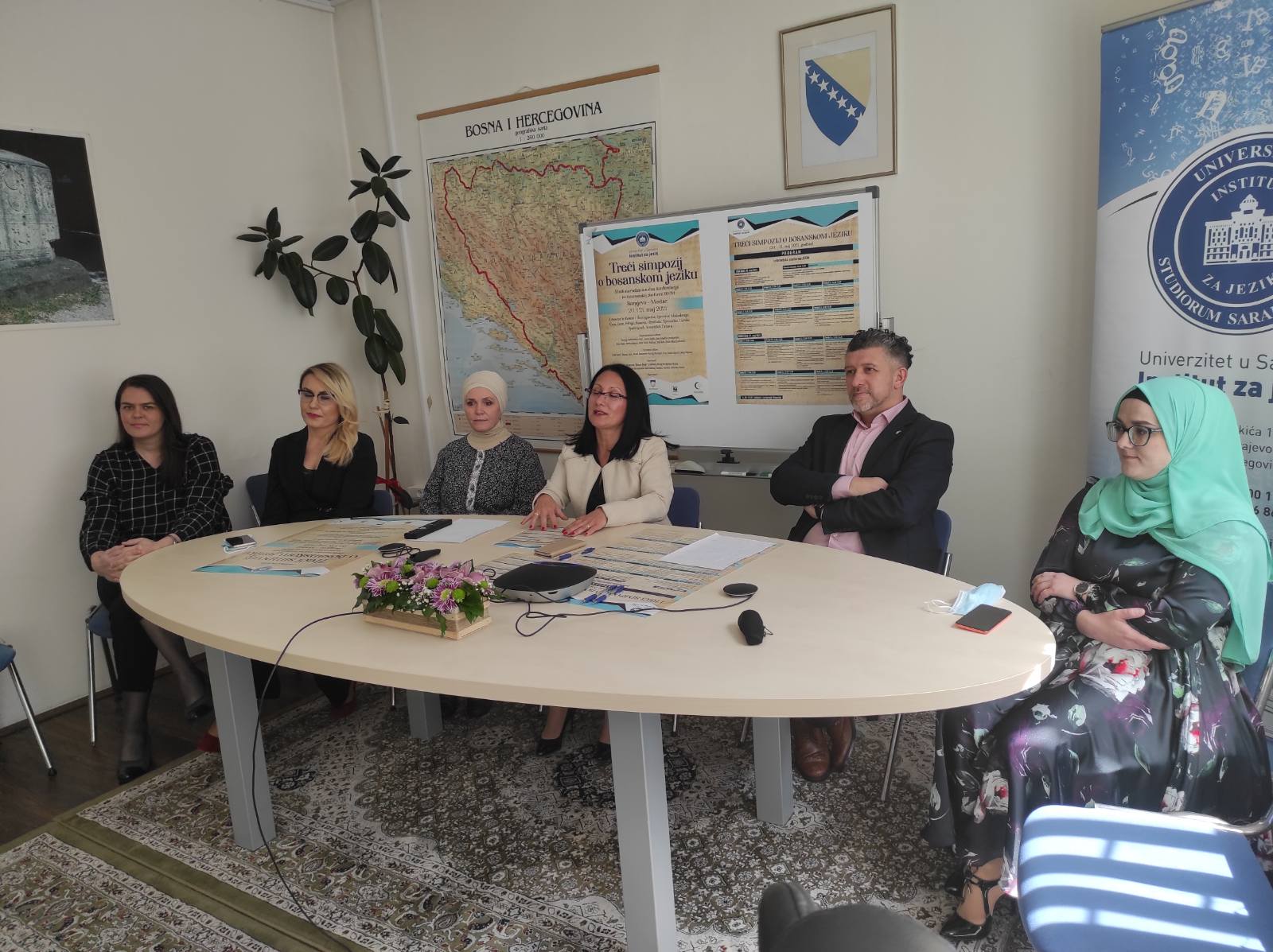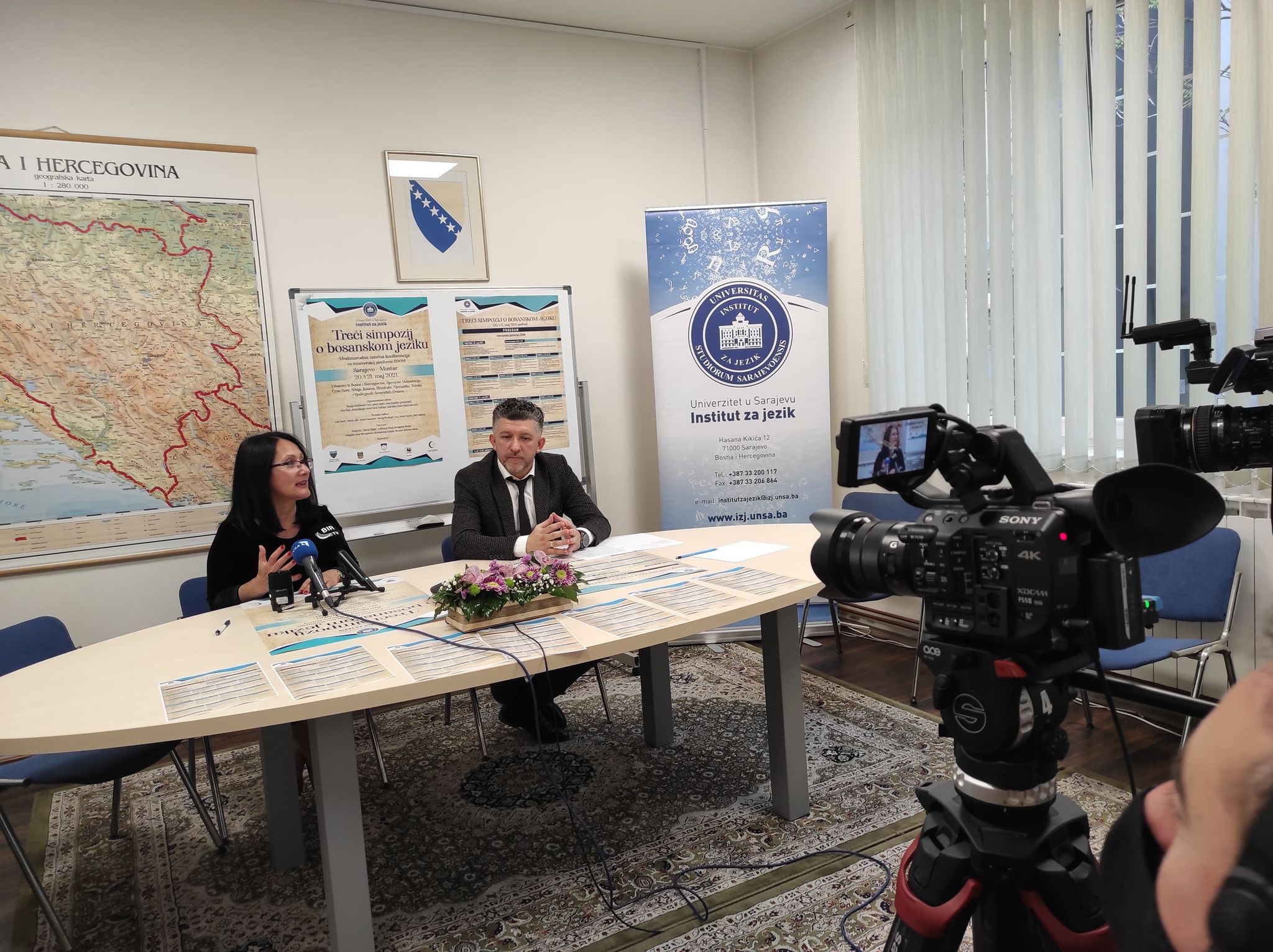BOSNIAN LANGUAGE – THE FOUNDATION OF THE STATEHOOD OF BOSNIA AND HERZEGOVINA
Kastva (Croatia): Panel discussion on the occasion of the Statehood Day of Bosnia and Herzegovina – November 25, 2020
BOSNIAN LANGUAGE – THE FOUNDATION OF THE STATEHOOD OF BOSNIA AND HERZEGOVINA
On the occasion of marking the Statehood Day of Bosnia and Herzegovina, a panel discussion “Bosnian language – the foundation of Bosnian statehood” was held in Kastva, organized by Bosniak associations of the Primorje-Gorski Kotar County, on November 25, 2020. Alen Kalajdžija, the director, and writer Hadžem Hajdarević participated on behalf of the Language Institute of the University of Sarajevo. The Panel was jointly organized by several Bosniak associations of the Primorje-Gorski Kotar County in the Republic of Croatia: the Council of the Bosniak National Minority of the City of Kastva, the Bosniak National Minority Council of the City of Rijeka, the Bosniak National Minority Council for the Primorje-Gorski Kotar County, Council of the Bosniak National Minority of the Municipality of Viškovo, Bosniak National Community for Primorje-Gorski Kotar County, Association of young Bosniaks and friends of the City of Rijeka and Primorje-Gorski Kotar County, and representative of the Bosniak national minority of the City of Crikvenica. The forum was opened with the intonation of the national anthems of the Republic of Croatia and Bosnia and Herzegovina, where, in the introductory part of the program, members of the Mixed Singing Choir “Sevdalije”, operating in the Bosniak national community for Primorje-Gorski Kotar County, presented themselves. The choir was conducted by the maestro Vedran Bolić.
The participants were also greeted by the Mayor of the City of Kastva, Mr. Matej Mostarac. After, in the role of host, the moderator of the forum Šuhra Dumanić greeted those present, congratulating the Statehood Day of Bosnia and Herzegovina, and after welcoming guests from the Institute of Language of the University of Sarajevo, a lecture on some important aspects of the history of Bosnian language and Bosnian language heritage. in the South Slavic and European language context, was held by the director of the Institute, Dr. Alen Kalajdžija. In the very introduction of his presentation, he reminded the audience of the project jointly organized by the Institute of Language of the University of Sarajevo and the Bosniak National Council of the City of Zagreb. In the program contents of this project, linguists of the Sarajevo Language Institute held lectures on certain aspects of the Bosnian language in all counties of the Republic of Croatia where members of the national minority who call their mother tongue Bosnian live. All this was for the purpose of supporting the teaching of Bosnian language and culture in the Republic of Croatia according to the C-model in primary and secondary schools.
In his lecture, Dr. Alen Kalajdžija pointed out many important points of achieving and promoting literacy in the Bosnian language from the earliest times to the time in which we live – from the Bosnian redaction of the Old Slavonic language, literacy that has been realized in bosančica for centuries, the alhamiado literacy, to the contemporary literary and overall Bosnian language tradition. The country of Bosnia is the center of one of the most layered cultural and historical rarities, as evidenced, among other things, by Bosnian stećak tombstones, rich oral epic and lyrical tradition, and literary works that have been strongly associated with Bosnia and the Bosnian language for centuries.
In his presentation, the writer Hadžem Hajdarević continued the theme of language as the foundation of the statehood of every state. He stressed that a nation without a state and the space in which it lives is like a planetary nomad who has no strength to cope. The history of Bosnia is the history of various fateful dramas, which, unfortunately, we rather don’t know than we know about… And as literary creators are a kind of “gardeners in the language”, with a few sentences about the literary tradition in Bosnia and in Bosnian, Hajdarević spoke selected verses from his latest poetry books.
Finally, one of the organizers of the forum “Bosnian language – the foundation of Bosnian statehood”, Denis Beganović, as a representative of the Bosniak national minority of the City of Crikvenica, presented in a video projection his literary work “Bosnia for All Time”, interpreted by Damir Maras.
Croatian Radio-Television, print media, such as the Rijeka daily Novi list, and many local Croatian and Bosnian portals provided information on the celebration of the Statehood Day of Bosnia and Herzegovina on March 25 in the town of Kastva, near Rijeka, in Primorje-Gorski Kotar County.
The hosts of the Panel, ie the representatives of Bosniak associations in this part of Croatia, thanking the guests for meaningful and important presentations, emphasized that in the future they should achieve more frequent and lasting cooperation with the Language Institute of the University of Sarajevo.





